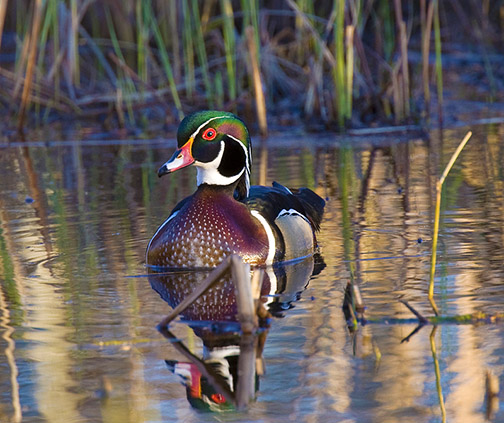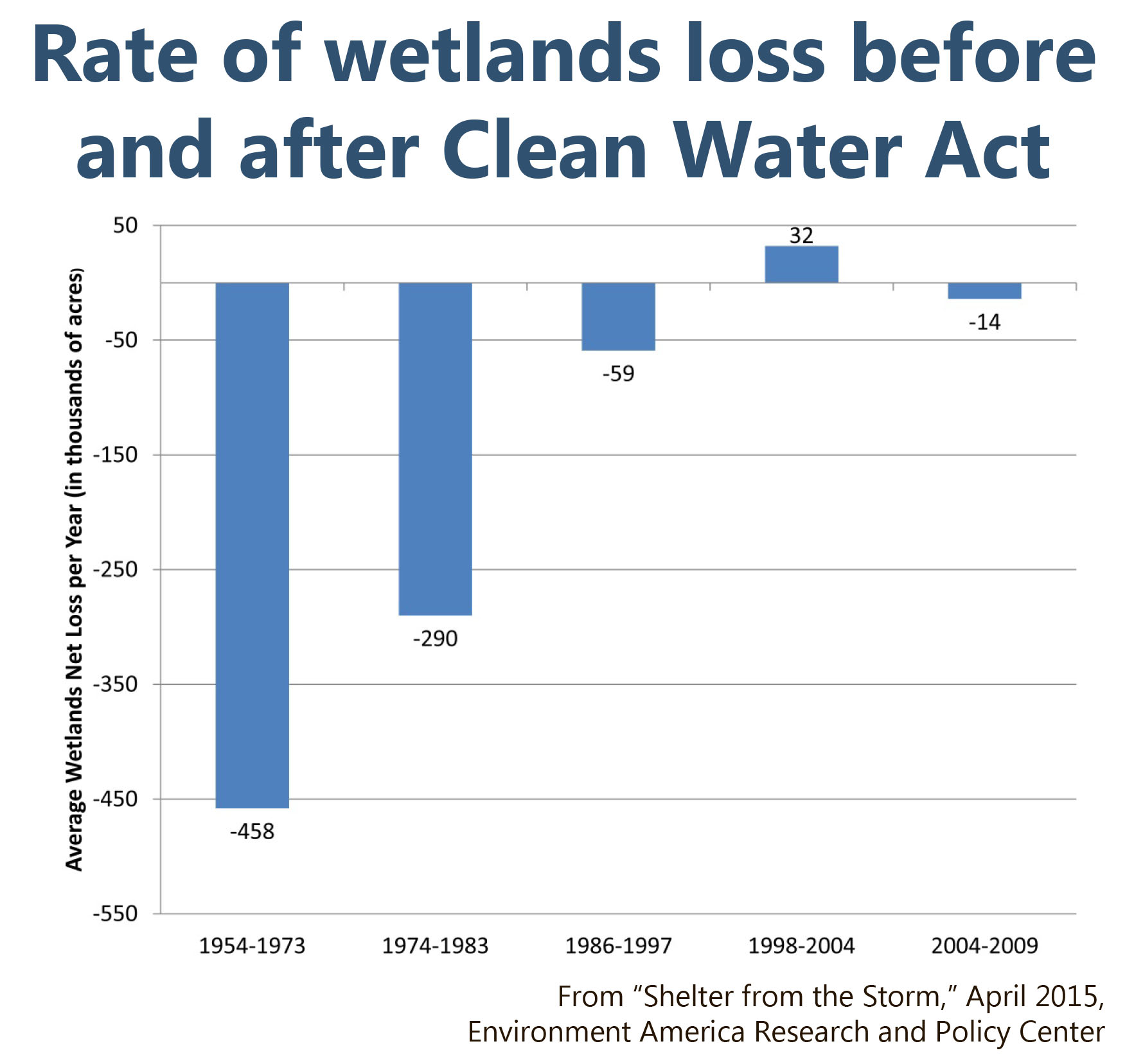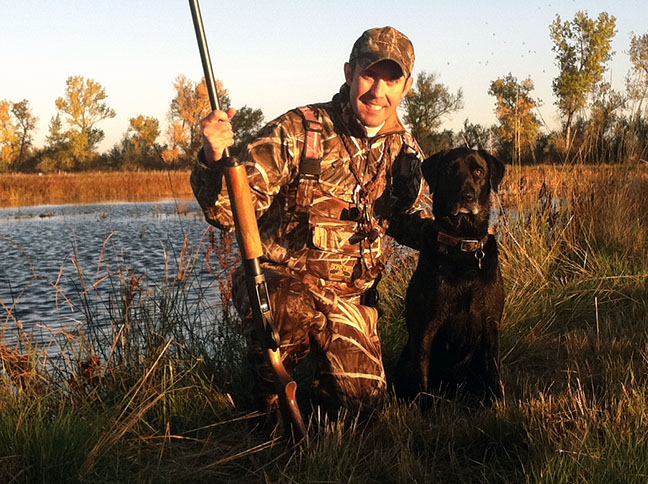All quacked up for wetlands
Without wetlands, ducks would be, well, sitting ducks. All of North America’s duck and goose species depend on wetland habitats for breeding, rearing, and/or for resting and foraging along their migratory flyways. Despite the many important reasons for protecting our remaining wetlands, in the last decade, wetlands have actually lost protection.

I love ducks! I’m not ashamed to admit words like widgeon, flyway, and drake make me geek out. Maybe it’s their epic migratory flights, or their variations in color and life history, or perhaps it’s because I see ducks more than any other creature while out enjoying my passion: fishing. For whatever reason, I just can’t get enough of ducks. They quack me up … pun intended.
I think my love of ducks started while hunting them when I was younger, but then I began feeling such an affinity for ducks that I just couldn’t shoot them anymore. Now that I’m a little older and long for a lifestyle of fishing, hunting, growing, raising, and foraging my own food, I’m taking up duck hunting again, and my connection to the majestic waterfowl has only grown stronger and more enriching. That’s something my non-hunting friends will never understand, and that’s okay (I’ve also gone to a meatless day a week in solidarity with my vegan friends).
You don’t have to hunt and fish to appreciate waterfowl. Just visit your local park — even if you live in the inner city — and you’ll probably find some ducks. You may also notice them flying overhead, possibly heading to the tip of South America or to Alaska’s arctic tundra.
Sitting ducks?
Without wetlands, ducks would be, well, sitting ducks. All of North America’s duck and goose species depend on wetland habitats for breeding, rearing, and/or for resting and foraging along their migratory flyways.
Environment America recently released the report “Shelter from the Storm” that showcases another reason why wetlands are so important: flood control. The report notes, “During times of heavy precipitation, wetlands act as a sponge — slowing the velocity of runoff and retaining excess water, thereby reducing the danger of flooding.”
Along with flood control and wildlife habitat, wetlands are also important for reducing water pollution, protecting against erosion, and recharging ground water. Recent reports indicate that even geographically-isolated wetlands are important to downstream water quality.
For the first few centuries in this country, wetlands got a bad rap. Wetlands were, so to speak, lame ducks. They were regarded as swampy lands that bred diseases, restricted overland travel, and impeded development and agriculture. According to the U.S. Geological Survey, at the time of European settlement, what is now the contiguous United States had approximately 221 million acres of wetlands. Today less than half those wetlands remain, and six states have lost 85 percent or more of their original wetlands.
Wetlands and ducks both have their fair share of negative puns. Bogged down, mired and swamped for the former; and dead duck, sitting duck and lame duck for the later. Bad raps and puns aside, both ducks and wetlands are valuable for many reasons, not least of which is the importance of duck hunting to conservation and the economy.
There are numerous state and federal conservation programs funded by hunter’s dollars through the purchase of hunting licenses and tags, and excise taxes on firearms and ammo. The Federal Duck Stamp is one of this country’s most successful federal conservation programs, and is an effective way for hunters to be involved in conserving America’s wetlands. Duck stamps have allowed for the purchase or lease of more than 6 million acres of wetland habitat through the National Wildlife Refuge System.
Migratory bird hunting — made possible in large part by wetland habitats — accounts for roughly $8 billion dollars in annual economic impact and creates 70,000 jobs. That’s not even counting the economic impact created by wetlands through fishing and wildlife viewing.
Calling fowl on loss of wetland protections
Despite the many important reasons for protecting our remaining wetlands, in the last decade, wetlands have actually lost protection. Passage of the federal Clean Water Act in 1972 was an extremely important step in stemming the loss of wetlands, but in 2001 and 2006, Supreme Court decisions left 20 million acres our nation’s wetlands vulnerable to being damaged or destroyed. In fact, the 2004-2009 timeframe saw a return to annual national wetland loss after improvements the prior six years.

Recently, the Environmental Protection Agency and Army Corps of Engineers proposed a rule that would restore protections to thousands of wetlands and streams across the country. The proposed clean water rule is not new regulation; it just restores much, but not all, of what was originally intended under the Clean Water Act.
As you might expect, big polluters and their friends in Congress have fought the rule tooth and nail from day one. The battle came to a head this week when some members of Congress made three separate attacks on the rule. The House will vote any day now on two bills designed to kill restoring protections for our waterways, and Senate is preparing similar “dirty water bills” for a vote in May. Take action now and tell your representative to support clean water.
Not ducking the truth about clean water
I’ve had the displeasure of watching many congressional hearings on clean water this session, and I say displeasure because the panel members invited to speak are mostly all opponents of the rule. A token supporter of the rule is also invited to speak, and one such speaker, Tim Mauck, country commissioner for Colorado’s Clear Creek County, has spoken at two hearings so far this year.
Listening to Mauck speak, it was clear to me that he is not only a great advocate for the drinking water and recreation economy of Clear Creek County, but he also speaks as sportsman whose support of the rule stems from his appreciation of hunting and fishing. Mauck’s testimony during a joint Senate-House hearing in February particularly resonated with me.
“This issue extends beyond my duties as an elected official, or even the economic benefits provided by clean water,” Mauck said at the hearing. “As someone who grew up hunting and fishing with my father throughout Colorado, I have a deeply personal connection to clean water. The Clean Water Act is an indispensable part of providing those hunting and fishing opportunities and passing America’s sporting tradition across generations. In all my time spent on the water, I see firsthand a simple truth: what happens upstream in the headwaters and connected wetlands makes its way downstream to our rivers and streams. The proposed rule simply recognizes this reality.”
Mauck just happens to live in the same state I call home, so I called him up to learn a little more about why he’s the go-to-guy for clean water this legislative session. Turns out Mauck’s passion is duck hunting.

“I love to fish, but that’s just something I do between duck seasons,” he said with a chuckle. “I’ve been doing it my whole life. My first duck trip was when I was six-years old.”
Mauck is active with his local chapter of Ducks Unlimited, and helped start Colorado Parks and Wildlife’s duck-hunting youth mentor program. When Mauck talks about hunting ducks, it’s not in terms of birds harvested or shotguns used, it’s about the experience in nature.
“Duck hunting is an exceptional way to escape and engage in nature,” he said. “I really enjoy the early mornings, the sunrise, the different species of wildlife I see as I sit there in silence. It’s very peaceful.”
Mauck also speaks in reverent tones of how he’s learned to be picky in what he shoots, passing on hens or species of ducks that might be down in population that year.
“There are mornings where I have had ducks land in the spread and I just sit there and watch; sometimes I pass on the majority of what comes in front of me,” he said. “I enjoy just being able to be there with them and watch them so closely.”
His passion for ducks and their habitats has guided his support of the clean water rule.
“Duck hunting is all about providing the right habitat, and clean water is so important,” Mauck said. “For waterfowl, small wetlands lack clarity of protections. Most waterfowl breed in small wetlands, which provide rearing for the hens and their young. When you have a dry year, you can see it in the migration reports in terms of number of ducks that reproduce. The water quality is also important because ducks won’t rear their young in water that is not up to par.
“The clean water rule is based on science to clarify a law that has otherwise worked exceptionally since its inception,” he continued. “For waterfowl and hunting it makes a great deal of sense. The rule also streamlines the regulatory process, provides exemptions for agriculture, and helps support the outdoor recreation economy, which is a sustainable, renewable economy. We have to be good stewards of our streams and wetlands to ensure that continues in the future.”
Sounds like, as a county commissioner, Mauck has his ducks in row.
How well do you know your wetlands? Take our quiz to find out.

